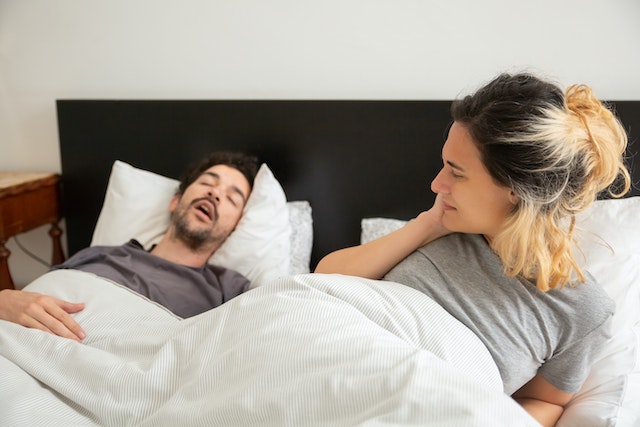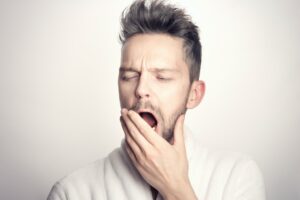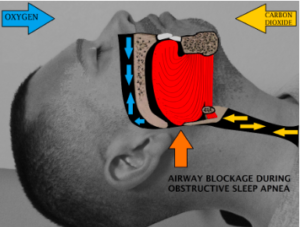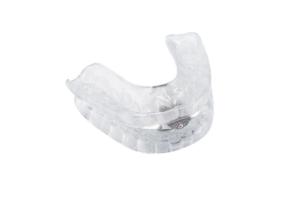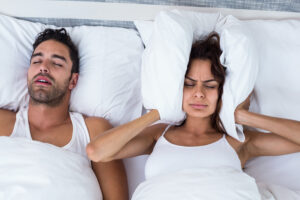Snoring is not a disease but a symptom, signifying obstruction impeding your airway whilst you sleep. Mostly, it is not dangerous and temporary but could red flag serious, underlying health problems, such as obstructive sleep apnoea (OSA), which require prompt treatment as it is also a high risk for heart disease, hypertension, depression and sleep problems (1).
Snorers seem worried and often seek treatment because snoring can be a nuisance to their sleeping partner. An otolaryngologist (ear, nose & throat doctor) revealed that snoring could put your marital relationship in trouble (2).
Certainly, snoring can be alleviated if approached correctly. Hence, this article will discuss the top effective snore cures, as per the latest medical research.
Anti-snoring solutions
Lifestyle changes:
Reduce weight:
Obesity can be a cause of snoring. A study published in the American Review of Respiratory Disease found more fatty tissue deposits around the neck (pharyngeal region), which may be compressing the airway and causing snoring in obese people (4). It further revealed that weight loss in those patients reduced the fatty tissues around their neck region and subsequent snoring.
Another piece of research found significant improvement in snoring among overweight people following weight loss (targeted BMI was 25 kg/m2). However, weight reduction was not helpful to those with a normal BMI (5).
Optimise hydration:
Dehydration can make nasal secretion sticky and clog your nostrils, which may contribute to snoring. Hence drinking well (3.7 and 2.7 litres/day for males and females, respectively) (6) could prevent this barely noticeable cause of snoring.
Avoid alcohol:
Drinking alcohol is not a reason for snoring, but it causes a few changes in your body, especially if you consume alcohol close to your bedtime. For instance, you may experience more pauses in breathing during sleep and reduced blood oxygen saturation, causing you to snore.
Hence, avoid alcohol at least 4 hours before your intended sleep time to avoid snoring and poor sleep7.
No more sleeping in a supine position:
Lying on the back (supine position) would make you snore more because it would cause the base of your tongue to collapse the back of your throat wall, but lying on your side would prevent that (3). You can use a body pillow to help maintain sleeping on your side.
You could also sleep on an incline or elevate your head with pillow support to keep your nasal passage open and avoid snoring when you sleep.
Avoid mouth-breathing during sleep:
Open mouth breathing contributes to fewer changes in the mouth and airway that exacerbate snoring and OSA. For instance, it causes a lower jaw drop, shrinking the throat diameter. It also reduces the length of dilator muscles in the upper airway. Open-mouth breathing has also been linked with the narrowing of the maxilla and mouth dryness.
Nasal changes could result in mouth breathing, but a study found 12% of people were habitual mouth breathers despite having no problem with nose breathing (8).
Use anti-snore mouth patch:
Mouth taping via an anti-snore mouth patch helps seal the mouth and forces you to breathe via the nose during sleep. Hence, mouth taping can save you from numerous unwanted orofacial changes and cure snoring.
A pilot study published in the official journal of the American Academy of Otolaryngology-Head and Neck Surgery found that the use of mouth patches in mouth breathers helped them breathe with their nose, and it also provoked positive changes in their palate and tongue, resulting in reduced snoring and few events of lapsed breathing (sleep apnoea patients) during sleep8.
Keep your nasal airway passages open:
Unclog your nostrils:
Rinse your nose to remove secretions or debris before sleep because fast-moving air through the stuffed nose can produce a snoring sound. You can also use salt water to cleanse your stuffy nose and clear the nasal air passage.
Avoid nasal congestion:
Nasal congestion is a strong, independent risk factor of snoring8 that can be due to nasal allergy (9).
A study published in BMJ (British Medical Journal) found intranasal steroid sprays effective in reversing nasal obstruction in patients with nasal allergy 9.
To avoid nasal congestion, you can also use nasal dilator strips that help stretch/pull the sides of your nose to dilate your nasal passage, which improves airflow and reduces air turbulence and subsequent snoring. Nasal strips can be a non-invasive, cheap and side effects-free way to reduce snoring (due to nasal congestion), but it is not the ultimate treatment in the presence of underlying problems which cause you to snore.
Additionally, check if your pillows are clean, especially when you suffer nasal allergy and obstruction only at night with snoring. Dust mites and animal dander can collect on sleep cushions. To avoid that, change your pillow cases regularly, air-dry/ air-fluff your pillows once every week and keep pets out of your bedroom to minimise the risk of nasal allergens (2).
Medical Interventions:
CPAP (continuous positive airway pressure):
This is a gold-standard therapy to curb snoring when all the lifestyle and other conservative measures fail, especially in snoring due to OSA.
As per John Hopkins, CPAP constantly blows steady pressurised air in your throat to keep your airway open while you sleep (3).
Although helpful, some find it uncomfortable to wear the mask or feel the machine attached all night. However, though a mask may feel strange at first, once you get used to it, snoring can be relieved and you should achieve good-quality sleep.
Anti-snoring mouthpiece:
A mandibular advancement device (MAD), such as a mouthguard, is an oral device that helps prevent airway blockage, which involves the base of the tongue.
A mouth guard or gum shield helps keep your lower jaw and tongue forward, which keeps your airway patent for easy breathing at night. It is helpful for mild-moderate snoring, especially in people who are:
- Normal weight or thin
- Do not want surgery
- Suffer snoring when lying on back
It can also be effective for people suffering from severe snoring and non-compliant with CPAP therapy (10).
Surgery:
Surgery can be an option if there is an anatomical issue causing airway obstruction and subsequent snoring. For instance, Uvulopalatopharyngoplasty (removal of tissue from the back of the throat, tonsils and uvula) is a surgical intervention, just like a facelift to your throat area. Similarly, Maxillo-Mandibular advancement (MMA) helps enhance airway patency by pushing the upper and lower jaw forward.
Besides, there is a procedure- radiofrequency ablation that shrinks the tissues in the throat, tongue and nose via low-intensity radio waves.
Hypoglossal nerve stimulation is another advanced mode of treatment that provokes the nerve (hypoglossal nerve) regulating the forward movements of the tongue so that it wouldn’t compromise your airway when you breathe (6).
Additionally, snorers with obesity can also have bariatric surgery (gastric-weight loss surgery) to treat snoring.
Take Home Message
Indeed, snoring is treatable. First, look around to see what is causing you to snore in the first place.
Small things can make big differences, such as simply cleaning your nostrils, regularly changing pillow covers, losing weight, and sleeping on your side can reduce snoring without needing medical treatment.
CPAP, anti-snore oral devices and surgery are available to relieve snoring if not curable by conventional measures.
References:
- Semelka, M., Wilson, J., & Floyd, R. (2016). Diagnosis and Treatment of Obstructive Sleep Apnea in Adults. American Family Physician, 94(5), 355–360. https://www.aafp.org/pubs/afp/issues/2016/0901/p355.html
- Melone, L. (2022, February 13). 7 Easy Snoring Remedies: Weight, Alcohol, Hydration, and More. WebMD. https://www.webmd.com/sleep-disorders/features/easy-snoring-remedies
- Johns Hopkins Medicine. (n.d.). Snoring. Www.hopkinsmedicine.org. Retrieved February 3, 2023, from https://www.hopkinsmedicine.org/health/conditions-and-diseases/snoring
- Shelton, K. E., Woodson, H., Gay, S., & Suratt, P. M. (1993). Pharyngeal fat in obstructive sleep apnea. The American Review of Respiratory Disease, 148(2), 462–466. https://doi.org/10.1164/ajrccm/148.2.462
- Shukla, A., Jain, S., Mishra, R., & Singh, A. (2013). Does ′weight reduction′ help all adult snorers? Lung India, 30(1), 16. https://doi.org/10.4103/0970-2113.106123
- Mayo Clinic. (n.d.). How much water do you need to stay healthy? Mayo Clinic. https://www.mayoclinic.org/healthy-lifestyle/nutrition-and-healthy-eating/in-depth/water/art-20044256#:~:text=About%2015.5%20cups%20(3.7%20liters
- Stein, M. D., & Friedmann, P. D. (2005). Disturbed sleep and its relationship to alcohol use. Substance Abuse, 26(1), 1–13. https://www.ncbi.nlm.nih.gov/pmc/articles/PMC2775419/
- Huang, T.-W., & Young, T.-H. (2014). Novel Porous Oral Patches for Patients with Mild Obstructive Sleep Apnea and Mouth Breathing. Otolaryngology–Head and Neck Surgery, 152(2), 369–373. https://doi.org/10.1177/0194599814559383
- T, Y., L, F., & M, P. (2001). Chronic nasal congestion at night is a risk factor for snoring in a population-based cohort study. Archives of Internal Medicine, 161(12). https://doi.org/10.1001/archinte.161.12.1514
- Kiely, J. L., Nolan, P., & McNicholas, W. T. (2004). Intranasal corticosteroid therapy for obstructive sleep apnoea in patients with co-existing rhinitis. Thorax, 59(1), 50–55. https://thorax.bmj.com/content/59/1/50
- Kotecha, B., & Shneerson, J. M. (2003). Treatment options for snoring and sleep apnoea. JRSM, 96(7), 343–344. https://doi.org/10.1258/jrsm.96.7.343

